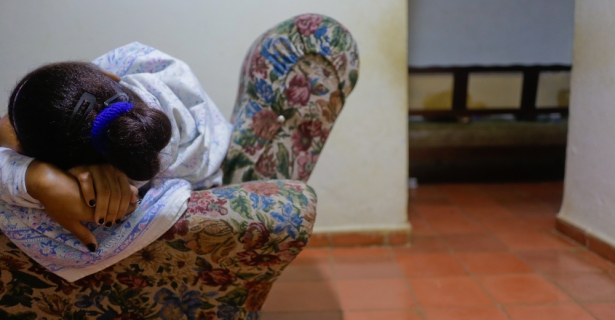Emily Bartlett is a senior majoring in International Relations and Nicola Pardy is a senior majoring in Political Science.
When Ernesto was two hours late in picking us up, we became slightly concerned. However, upon his hurried arrival he explained that there had been an earthquake with a magnitude of 5.0 off the coast. Apparently it sent various people on the 5th and 6th floors running out of their homes, yet we had remained oblivious! We were happy to hear that no one was seriously hurt.
A little shaken up, we headed to Alamar in the dark. It takes a while to get used to nighttime in Cuba due to the lack of streetlights and electricity in general—the darkness initially seems made us a little uneasy, but locals repeatedly told us that even at night, the country is generally very safe 24/7. We approached the apartment and found Carmen and her boyfriend hanging out outside, speaking in low voices and giggling together. We gave her privacy and patiently waited for her to come back inside, watching Cuban telenovelas to pass the time. In the meantime, Carmen’s mother plied us with freshly squeezed guava juice along with fruit pastries, which made for a fabulous dinner.
Carmen emerged about forty minutes later, smiling and in high spirits. She sat down with us and started to chat. Immediately, her six-year-old brother jumped into her lap, very happy to see her. Carmen had an impressive patience with this little ball of energy—we never saw her snap or squabble with her brother, only chastise him gently with a marked “David…” if he got out of hand.
Carmen and her mother then took us for a walk around the neighborhood. At first the four of us walked together, with little David lagging behind. Carmen’s mother spoke to us about life in general in Alamar, speaking mostly about family structure norms. Marriage, she said, is not seen as the ‘be all end all’ of romantic relations as it certainly is considered in American culture. In fact, most of Carmen’s friends’ parents were never married, even though they had been together for years. If a relationship doesn’t last, even after a couple has a child, they simply separate and find someone better suited for them. We were intrigued by how frankly Carmen’s mother described this. Unfortunately, when couples do separate, women are mostly left with the sole responsibility of the children. Carmen’s mother explained that despite the strength and progress of women in Cuba, many Cuban men are still extremely machismo.
Later, when Carmen’s mother was out of earshot, she opened up about her life a little more freely. She started talking about past relationships and the reasons that they ended, and then explained that her current relationship was much healthier than others in the past. We moved onto friends, school, and finally what she was passionate about—she explained that she wanted to be a pediatrician when she grew up, because she wanted to care for and help people.
Carmen also divulged what her priorities were for the future, in a remarkably realistic and mature manner. Yes, family is and will be the most important part of her life—but she wants to establish a career before thinking about starting her own family, and wants to maintain her career while caring for her children.
At the end of the evening, we felt much closer to Carmen and enjoyed the relaxed, easy-going atmosphere as we watched her favorite shows with her in the living room. She fell asleep on the sofa while watching what was an entirely nonsensical show to us extranjeras, and we retired early so as to wake up with her the next morning and attempt to go to school with her.


Add new comment